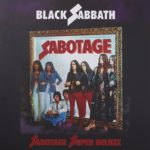Talk to the Black Sabbath devoted and likely they will attest that the first five albums from the English heavy rock masters- including Paranoid and Sabbath Bloody Sabbath– are the works of gods. Yet, more often than not, the same fans will point to Sabotage, the band’s sixth, as an album just as potent, though sometimes criminally overlooked. Yes, it has maybe the least threatening cover art of any heavy band ever (Bill Ward’s tight, blood-red leggings, alone), but inside is an innovative, relentless quartet of musical marauders ripping holes in the sky. So, it makes sense that label Rhino, in keeping with the ongoing revitalization of the Hall of Fame group’s catalog, offers a super deluxe edition, featuring a spoil of extras, honoring this pearl.
Most importantly, the proper album, in remastered form, sounds exceptionally crisp and warm. Recorded during a period in which Sabbath moved further afoot into progressive rock territory- adding synths, working with the English Chamber Choir- it’s critical that any update achieves the fidelity of vintage vinyl; encompassing the power and delicacy of everything that was going on in its original form. They’ve done it exceptionally well. The add-ons- two beautiful booklets with dozens of classic photos, a tour poster, and the “Am I Going Insane” (radio edit) single- are quite pleasing; well-constructed artistically and aesthetically.
All things considered, the paramount reason to seek out the super deluxe edition is the double-disc live set. Taken from the band’s 1975 North American tour, the 16 chosen cuts (13 previously unreleased) re-create a complete concert, articulating and amplifying the singular, otherworldly experience of a prime Sabbath show: Ozzy Osbourne’s unmistakable vocals expanding the limits of passion, spirit, and range; Tony Iommi’s reservoir of rock riffs spawning a thousand imitators; Geezer Butler’s indomitable bass playing; Ward’s dexterous thunder and versatility on drums. All of it like black powder igniting on a spark of Iommi feedback, with ideas so boundless- some tracks are given place-holding titles such as “Jam 1,” “Jam 2,” and “Guitar Solo,”- yet forcefully interdependent. Black Sabbath’s musical path started shifting after Sabotage, making the album, in hindsight, a marker for an end of an era. The band would go on and create some memorable, vital music, eventually with Ronnie James Dio slotting in after Ozzy’s departure in 1978. Now, especially in light of this excellent box, it’s even harder to imagine any of Sabbath’s devoted fans, new and old, relenting in their immortal praise of Sabotage.



No Comments comments associated with this post